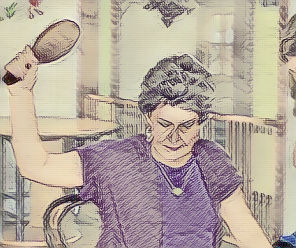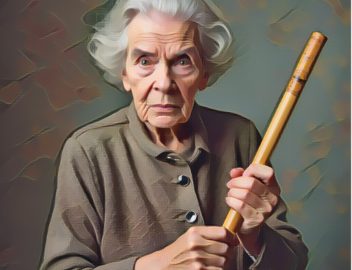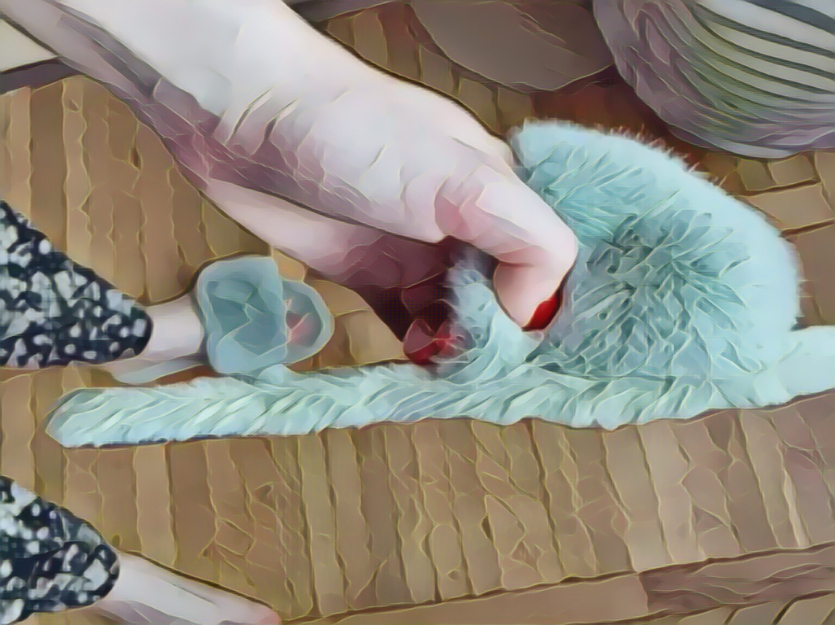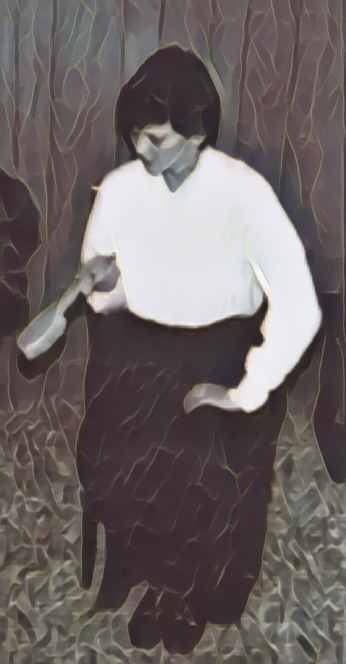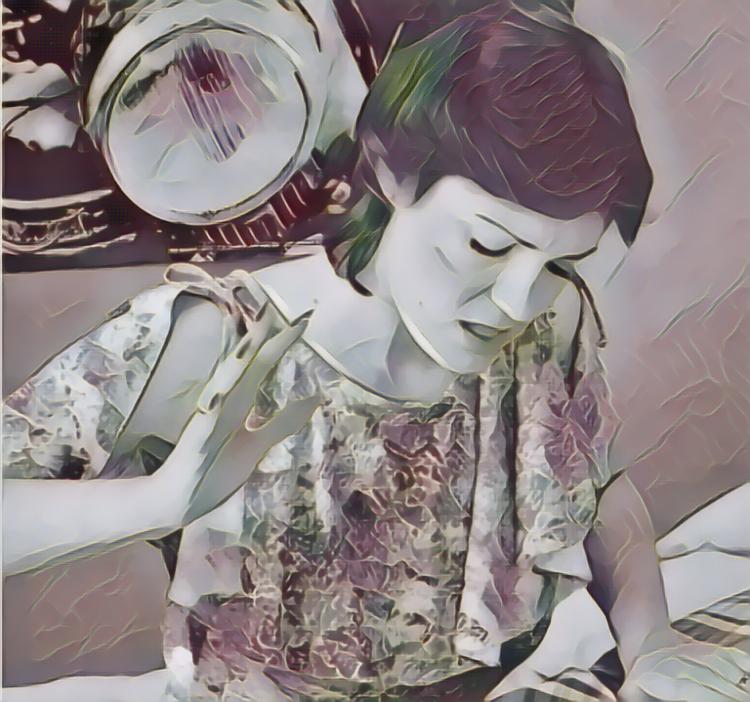Back when I was in my formative years, my sister and I went to live with my Aunt Dolly while my mother was going through some hard times.
Aunt Dolly was a semi stout Christian woman from Texas, always dressed in her Sunday best, not a grey hair out of place. Though she was only in her 50s, the years had not been kind to her—she looked much older than her age, her face lined with the weight of her convictions and the burdens she carried.
Her house was as much a reflection of her as her beliefs. The exterior was a modest, weathered Texas home, surrounded by a white picket fence that had seen better days. A creaky porch swing sat to one side, swaying gently in the breeze, and flower beds lined the walkway—petunias and marigolds Aunt Dolly tended with careful hands. (short pause) Inside, the scent of lemon polish greeted you at the door, mingling with the faint aroma of home-cooked meals. Every shelf was crowded with religious knickknacks—ceramic angels, tiny crosses, and Bible verses in delicate frames. Family photos in ornate gold frames watched over every room, and the ever-present hum of a box fan in the hallway was a constant companion, cutting through
Aunt Dolly’s Christianity was the center of her life, woven into every moment of our days. Each morning began with her reading a passage from the Bible at the kitchen table, her voice steady and solemn. She kept a well-worn Bible on the counter, its pages marked with notes and pressed flowers. (short pause) Every meal, no matter how simple, started with Aunt Dolly leading us in saying grace. She would fold her hands, bow her head, and speak in a reverent tone, giving thanks for the food and asking for God’s guidance. We were expected to sit quietly, hands folded, and listen to her words before we could take a single bite. (short pause) At bedtime, Aunt Dolly insisted on a ritual of prayer. She would gather us in the living room, turn off the television, and have everyone kneel on the carpet. With her hands clasped tightly, she would lead us in reciting prayers, her voice unwavering, making sure each of us spoke our part. These routines were not just habits—they were sacred duties, and Aunt Dolly believed they were as important to our upbringing as any rule or punishment. (short pause) She saw these rituals as a way to instill faith, discipline, and respect, and missing them was simply not allowed.
For Aunt Dolly, discipline was not just a household rule—it was a godly duty. She believed, with unwavering conviction, that the Bible called for strict correction, and she saw frequent spanking for any transgression as a righteous act.
Aunt Dolly would say that sparing the rod was spoiling the child, and she made sure to uphold her Christian values by correcting even the smallest misbehaviour, no matter how minor.
I was studying the capitals of the United States, as I was supposed to memorize them for school. All day through the weekend, I spent in my room with nothing but a list of the states and their capitals.
Every hour, Aunt Dolly would come in and quiz me. If I didn’t know as many as she thought I should, I had to go to bed and receive smacks on my bottom with either a hairbrush or a kitchen spatula—whichever she had at the time—for every one I did not know. (short pause) The hairbrush was a heavy, old-fashioned thing, its wooden back smooth and polished from years of use, the bristles worn down and splayed at the edges. It felt cool and solid in the hand, but against the skin, it delivered a sharp, stinging blow that left a deep ache. The spatula, on the other hand, was a wide, flat paddle of pale wood, its handle rounded and easy to grip, the surface slightly warped from years of kitchen work and discipline alike. The spatula’s edge was blunt but unyielding, and the sound it made—a flat, echoing smack—seemed to fill the whole room. Just the sight of either tool resting on the counter or in Aunt Dolly’s hand was enough to make my stomach twist with dread. She saw this as her Christian responsibility, believing that each spanking was a lesson in obedience and respect.
A typical spanking from Aunt Dolly followed a ritual as unwavering as her faith. The moment she decided discipline was needed, she would call me into the living room, her voice firm but never raised. The air would feel heavy, thick with anticipation and dread. The room itself seemed to shrink, the ticking of the wall clock growing louder as I shuffled in, head bowed, heart pounding in my chest. (short pause)
Aunt Dolly would sit down in her favorite armchair, the same one she used for reading her Bible, and gesture for me to stand before her. She’d reach for the hairbrush or the spatula—whichever was closest, both worn smooth from use. Her face was always composed, lips pressed in a thin line, her eyes steady and unwavering. She would remind me, in a calm, almost sorrowful tone, that this was for my own good, that the Lord expected her to correct me. (short pause)
The ritual was always the same. I’d be told to bend over her knee, my hands gripping the arm of the chair, my breath coming in shallow bursts. The anticipation was almost worse than the spanking itself—my skin prickling, my stomach twisting with fear and shame. The first smack would land with a sharp sting, the sound echoing in the quiet room. Each swat was deliberate, measured, and accompanied by a stern reminder of what I’d done wrong. (short pause)
Tears would come quickly, hot and silent at first, then sobs I couldn’t hold back. Aunt Dolly never yelled, never lost her composure. She believed this was her duty, and she carried it out with a kind of grim resolve. When it was over, she would set the hairbrush or spatula aside, help me to my feet, and tell me to pray for forgiveness and strength to do better. (short pause)
The aftermath was always the same—a burning ache, a sense of humiliation, and a heavy heart. I’d retreat to my room, wiping my eyes, the lesson lingering long after the pain faded. Aunt Dolly would return to her chores, her face unreadable, as if nothing had happened. But for me, the memory of each spanking stayed with me, shaping my days with fear and a desperate hope to avoid the next one. (short pause)
At the time it was not known, but I had (and still have) attention deficit disorder, which caused me not to be able to remember a lot. This caused my bottom to be smacked many times.
They were always with a hairbrush or spatula. The hairbrush, with its solid wooden back and faded bristles, seemed to carry the weight of Aunt Dolly’s resolve in every stroke. The spatula, broad and pale, was as much a fixture in the kitchen as it was in her discipline, its surface smooth but unyielding. Just the memory of their texture—the cool, hard wood of the brush, the flat, unforgiving face of the spatula—still makes my skin prickle.
We stayed with Aunt Dolly for about 18 months and received too many spankings to count—at least two a week at a minimum, if Aunt Dolly was in a good mood that week. She truly believed that frequent spanking was justified, and that it was her Christian obligation to correct us for every misstep.
Almost everything we did wrong constituted a spanking—not washing dishes correctly, not waking up immediately for school, forgetting to let the dog out. Aunt Dolly saw each of these as a test of her faith and her duty to raise us right in the eyes of God.
The whole time I stayed with Aunt Dolly, I was afraid of what excuse she would find next to punish me. For her, discipline was a sacred responsibility, and she never hesitated to act on it. Once we returned to my mother, we never saw Aunt Dolly again.
